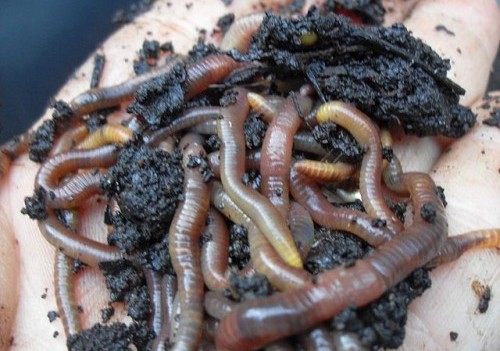Worm castings, or worm humus, are the nutrient-rich end products of the vermicomposting process. During the process of vermicomposting, biodegradable materials are broken down with the help of certain types of worms. The worms act on the organic materials by eating them and digesting them. Not surprisingly, the end results are the worm castings or what is actually worm manure. While many may be disgusted at the idea of what worm castings are at first, they will be surprised and fascinated to find just how advantageous these worm droppings are for your plants
Worm Castings Are Nutrient-Rich
Studies have shown that worm castings are far richer in nutrients than most gardening soils. They have greater amounts of nitrogen and phosphates that promote plant growth, and are also rich in bacteria and enzymes that are beneficial for the plants. All in all, worm castings have been found to be important for the growth of healthier plants, for the improvement of soil texture, and for providing water soluble nutrients to the plants.
Gardens that have made use of these natural fertilizers have been found to produce plants with an increase of 20% in plant growth and up to 150% increase in root mass. These results were gathered from a garden that used just one part worm castings to 9 parts soil. Imagine what more worm castings could do for your plants.
What Are Worm Castings’ Soil Benefits?
Worm castings have been found to provide nutrients that promote the growth of healthier plants. On top of this, the organic material has also been found to be greatly beneficial for the soil that it is used on. The overall physical structure of the soil is improved, thus attracting more deep-burrowing earthworms than what are already present in the area. Soil benefits also include an increase in water holding capacity, better germination, plant growth, and crop yield, and an improvement in the root structure of the plants.
Produce Your Own Compost and Worm Castings
Now that you know why natural compost and worm castings are essential for the health of your plants, it is time to learn how you can produce your own at home. The first thing that you will need is a bin that will serve as the container for your biodegradable materials and the worms. You should be careful in selecting the bins for your own compost system as some materials, such as metal, can be harmful for the worms that you will use for vermicomposting.
This brings us to the next essential ingredient for your compost system: the worms. Not all worms are ideal for producing worm castings and compost. If you are not sure what type of worm to add to your compost system, ask the experts or do some research. Red wiggler worms are some of the most commonly used for composting. Under the right conditions, they can produce their own weight in castings and compost in a period of 24 hours.
Finally, you will need biodegradable material and other foods for your worms. Vegetable and fruit wastes are some of the most ideal foods for the red wiggler worm. However, citrus fruits should be used in moderation as too much of them can be bad for the wigglers. You can also use shredded cardboard and newspapers as these will add fiber to the worms’ diet. Moldy bread, as well as old leaves and grass will also be appropriate for your worm composters, but do stay away from meat wastes and dairy products
Buying Your Vermicomposting System
Thanks to the wide use of vermicomposting, many gardening stores now offer products that will help your own worm castings at home. There are also a number of websites that offer tips and how-to guides for those who are just introducing themselves to vermicomposting. You can check out out some of the links at the top of this page for more information.
Of course, you can also ask experts or those who have had experiences with vermicomposting. This way, you will not need to waste your time, energy, and your money on products and systems that do not work. Remember that while vermicomposting may appear to be a very simple and straightforward process, it should not be underestimated in any way. Check out our selection of worm composting bins and get started creating your own worm castings today!
Article by Donny B


Be the first to comment